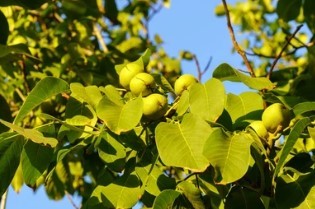Juglandaceae Plant Tissue Culture
 Juglandaceae plant with nuts.
Juglandaceae plant with nuts.
As well-known woody oilseed and dried fruit species,
juglandaceae plants are of great economic value. Our
tissue culture technology enables rapid and massive
propagation of Juglandaceae seedlings for economic
forestry and horticultural use.
The Juglandaceae are a plant family known as the walnut family, with 72 species in 9 genera, distributed intermittently in Eurasia, America, and Southeast Asia. Juglandaceae plants are deciduous, semi-evergreen, or evergreen trees with pinnately compound leaves, no stipules, flowers unisexual, and monoecious. Juglandaceae plant is a famous economic tree species with edible, medicinal, and ornamental value. Some of these species are important nut and woody oil crops, and some arevaluable timber trees.
Tissue culture service
The traditional propagation method of Juglandaceae plants is mainly based on seed propagation. Still, this propagation method is prone to variation, and it is easy to lose the characteristics of excellent varieties. Therefore, plant researchers focus on asexual reproduction techniques, especially tissue culture techniques.
To speed up the seedling breeding of Juglandaceae plants and shorten its breeding time, Lifeasible has made a series of efforts. We have established a complete rapid propagation system for Juglandaceae plants, providing tailor-made Juglandaceae plant tissue culture services for global customers. Our tissue culture techniques include embryo culture, zygotic embryo germination in vitro, organ culture, and callus induction.
Embryo culture
- The production of somatic and secondary embryos is very demanding on the minimum medium, so we recommend that you select the hypocotyls and cotyledons of young embryos of Juglandaceae plants to obtain somatic embryos. After the somatic embryo is formed, it goes through a period of dormancy. Therefore, we will use low-temperature treatment to break somatic embryo dormancy to obtain complete plants.
- The basal medium suitable for Juglandaceae plant embryo culture includes DKW, MS, WPM, etc.
Germination of zygotic embryos in vitro
- Zygotic embryos can rapidly develop into a complete plant when cultured in vitro. Therefore, we can use the zygotic embryos of Juglandaceae plants to establish a sterile propagation system quickly.
- To increase the success rate, we cultured embryos without cotyledons on a WPM medium.
Organ culture
- We recommend that you choose young stem segments, buds, leaves, embryos, cotyledons, etc., as explants. We will thoroughly and thoroughly sterilize the explants and choose MS or DKW as the basal medium.
- During the culturing process, appropriate proportions of BA and IBA were added to stimulate axillary buds' continuous differentiation and growth and induce adventitious buds.
Callus induction
- The callus of Juglandaceae plants is difficult to induce. But we have a wealth of experience and can provide you with the perfect solution. We used leaves as explants, selected MS as the basal medium, and combined cytokinin and auxin to induce callus formation.
- After the callus is formed, the differentiation of adventitious shoots is induced by cytokinins such as KT, BA, and ZT.
Key points
In the process of tissue culture of Juglandaceae plants, the induction of adventitious roots is difficult. Combining years of experience, we have summarized four feasible methods: short-term treatment of high-concentration hormones, long-term treatment of low-concentration hormones, activated carbon and phloroglucinol treatment, and black paper shading treatment.
If you are interested in our services, please feel free to contact us for more information or to discuss in detail.
You want to sign a confidentiality agreement.
You have a specific plant species for your experimental needs.
You have a reliable and relevant cooperation project to discuss.
You are very interested in our project or have any questions.
You need an updated and detailed quotation.
For research or industrial use.

 Juglandaceae plant with nuts.
Juglandaceae plant with nuts.
